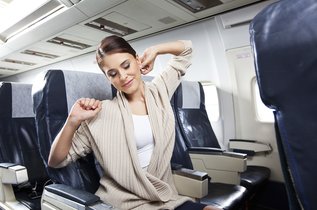So we’ve put together some ways you can make your journey a more pleasant and healthy one and arrive at your destination ready to enjoy your break.
Stay hydrated. Cabin air is very dry and as the fact that it’s re circulated makes matters worse. So take on plenty of water – and start the process before you board the plane so you’re already well hydrated before take-off. Try to avoid the temptation of drinking more than a little alcohol or caffeine as these type of drinks will dehydrate you.
Budget airlines don’t provide water so once you’re through security, stock up with a bottle or two before you board.
Contact lens wearers may find it beneficial to have a bottle of solution handy as the dry air will make eyes uncomfortable.
Keep on the move. Make sure to get up and walk around frequently. This keeps the blood flowing and reduces the risks of DVT. In between taking circuits of the cabin, and do a few leg and foot exercises while you’re sitting down to increase the blood flow. NHS Choices recommends bending and straightening your legs and pressing the balls of your feet down hard against the floor.
Dress the part. Wear loose fitting clothing made of natural materials to stop you getting too hot or constricting your circulation.
Look out for your ears. The change in air pressure during take-off and landing can cause your ears to pop and it can be painful. It’s even worse if you’re suffering from a cold. Try to avoid this by chewing gum or sucking a sweet. Yawning or holding your nose and blowing through it can also help clear the ears.
The sensation of popping ears can be un nerving for young children – to help minimise the effects, try to keep them awake for take-off and landing and a pacifier or bottle will get produce the swallowing effects which will hopefully reduce the pressure in their ears.
Get the timing right. Jet lag is caused when our bodies get thrown out of sync by experiencing daylight when it expects night. It’s worse when travelling from west to east. To minimise its effects, make sure you’re not tired before you set off and also try and get some sleep on the flight – this should help you stay up until night time when you arrive at your destination.
A few days before you travel, try going to bed a little earlier if you’re travelling eastwards or a bit later if you’re going west.
Try switching your watch to the local time of your destination when you board so that you're a bit more acclimatised when you arrive.
As a rule of thumb, try to get as many hours sleep in a 24 hour period as you usually would.
And finally, if you are taking any prescribed medication, you should check with your doctor when you take this if you’re travelling across time zones.








